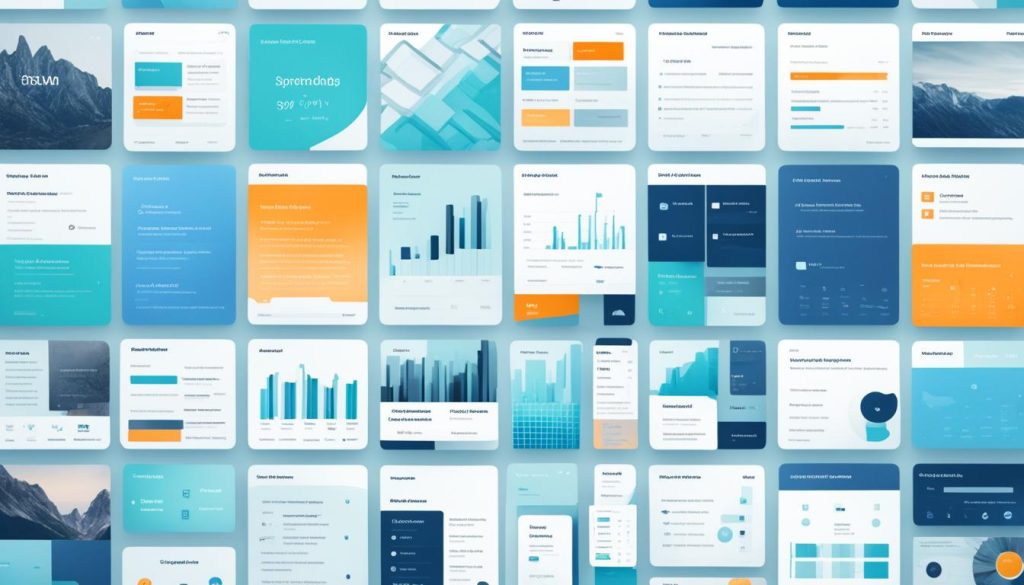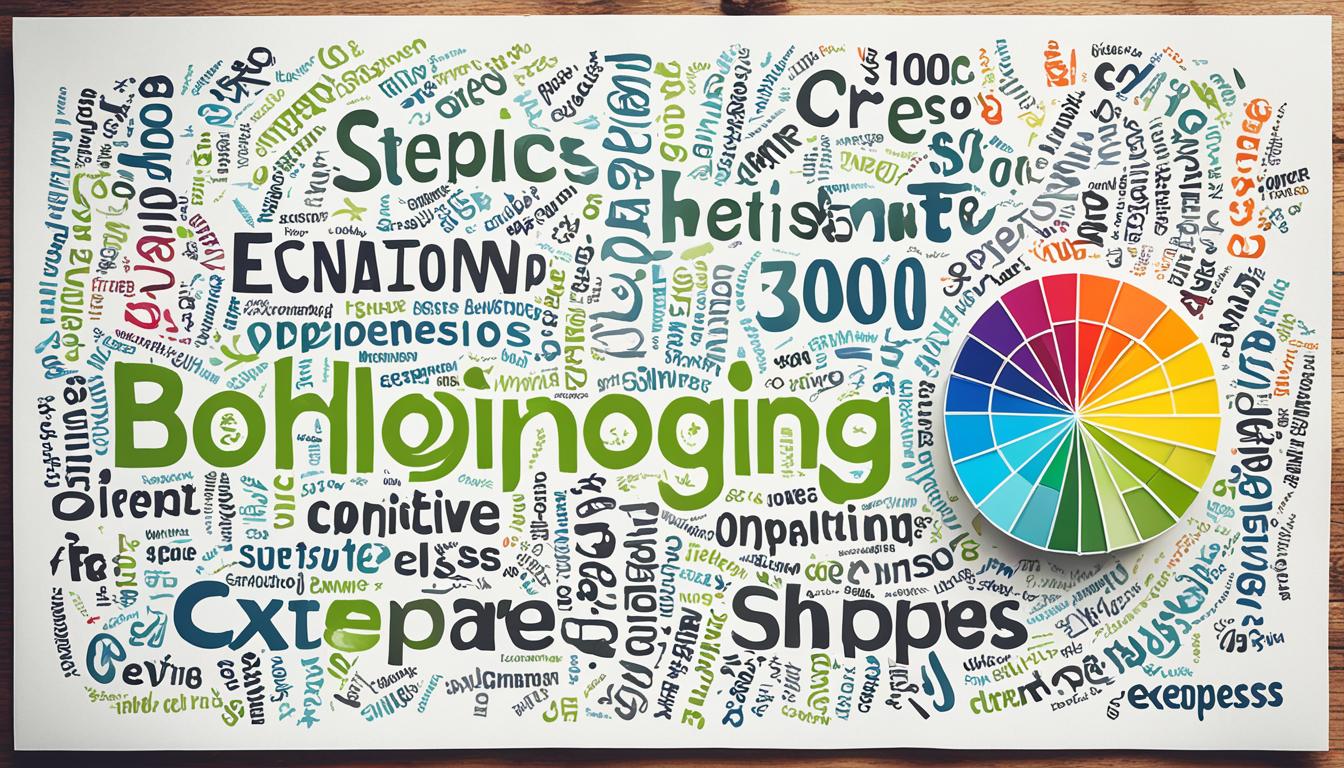Are you ready to start your own blog but worry about the costs? Did you know that starting a full-time blog in 2024 costs about $941.40? It’s important to know the different expenses and plan your budget well. This guide will help you manage your blog’s money, from choosing hosting to making more money.
Whether you blog for fun, as a side job, or want to make it a full-time job, this article has you covered. It offers tips to start wisely, stay smart with money, and make the most of your blog.
Understanding the Costs of Blogging
Starting a blog takes more than just passion and creativity. You’ll need to think about various costs to keep your blog going. Let’s look at the main expenses you’ll face when starting your blog.
Essential Expenses: Domain, Hosting, and Platform
Starting a blog means getting a domain name, web hosting, and a CMS like WordPress. Domain names cost between $5 and $15 per year. Web hosting prices range from $2.95 to $91.71 per month, based on the provider and plan. WordPress, a top CMS for bloggers, is free.
Optional Expenses: Tools, Plugins, and Marketing
There are also tools and services you can pay for to improve your blog. These include keyword research tools, image optimization plugins, and advertising or influencer partnerships. Prices for these can be low or very high, from free to hundreds of dollars per month, based on what you need and your blog’s size.
| Blog Essential Expenses | Blog Optional Expenses |
|---|---|
|
|
Estimating Your Blog’s Monthly Expenses
Running a successful blog means knowing your monthly costs. You’ll need to pay for things like domain names, hosting, and platform fees. You might also spend on tools, plugins, and marketing. It’s key to understand these costs to plan and manage your blog’s finances well.
Here are the main things to think about when figuring out your blog’s monthly costs:
- Domain and Hosting Costs: The cost for your domain name and web hosting can change a lot. Look into providers like GoDaddy, Bluehost, or HostGator to see what they charge monthly or yearly.
- Platform and Subscription Fees: If you’re on a paid blogging platform, like WordPress.com or Squarespace, remember to include the monthly or yearly fees. Don’t forget about any extra plugins, themes, or add-ons you might need.
- Content Creation Expenses: Making great content might mean paying writers, designers, or creators. Think about these costs when planning your monthly budget.
- Marketing and Promotion: Spending on ads, social media, or influencer partnerships can add up. Set aside some money for these marketing efforts.
Think about these costs to get a good idea of what your blog might spend each month. This helps you make smart choices, use your money well, and keep your blog going strong.
| Expense Category | Estimated Monthly Cost |
|---|---|
| Domain and Hosting | $5 – $50 |
| Platform and Subscription Fees | $0 – $100 |
| Content Creation | $100 – $500 |
| Marketing and Promotion | $50 – $500 |
| Total Estimated Monthly Expenses | $155 – $1,150 |
These are just rough estimates, and your actual costs might be different. Your blog’s needs and goals will affect your spending. Keep an eye on your budget and adjust it as needed to keep your blog healthy and growing.
Creating a Realistic Budget for Your Blog
Creating a realistic budget for your blog is key to its success. First, figure out your income and revenue streams. This includes things like ads, affiliate marketing, sponsored posts, and other ways to make money. Knowing what you’ll earn helps you decide what to spend and how to use your money wisely.
Calculating Your Income and Revenue Streams
Start by guessing how much you might make from different sources. This could be:
- Money from ads or sponsored posts
- Commissions from affiliate marketing
- Sales of digital products like ebooks or courses
- Income from consulting or freelance work
With a clear idea of your income, you can then decide what to spend on and find ways to save.
Prioritizing Expenses and Cutting Costs
First, put money aside for must-have costs like domain and hosting. Then, think about spending on things like tools, marketing, and hiring others. By looking closely at what you need and finding ways to save, you can make sure your blog budget works well.

Checking and adjusting your budget often keeps you in control of your blog’s money. This lets you focus on making great content and growing your readership.
Budgeting for Blog Expenses
When planning for blog expense budgeting, it’s crucial to make a detailed budget. This budget should cover both must-have and nice-to-have expenses. By looking closely at your blog’s financial needs, you can decide where to spend your money wisely. You can also find ways to save and plan for future growth.
Having a solid blog expense budget helps you manage your money well. It also gives you insights into your blog’s financial health and performance over time. This approach to blog financial planning is key for long-term success and growth.
To make a thorough blog expense budgeting plan, think about these main points:
- First, list essential costs like domain registration, web hosting, and platform fees.
- Then, consider optional costs for tools, plugins, and marketing to improve your blog.
- Calculate your monthly costs and set aside money for unexpected expenses.
- Save money for content creation, design, and upkeep to keep your blog interesting.
- Keep an eye on your blog financial planning and adjust it as your blog grows and changes.
By being proactive with blog expense budgeting, you can make sure your blog does well in the long run. This way, your blog can reach its full potential for success.

Tracking and Adjusting Your Blog Budget
Keeping a close eye on your blog’s money is key for success. By tracking your blog budget regularly, you can spot where to save money, find new ways to make money, or move funds to support your blogging goals.
Regularly tracking your blog budget and watching your spending helps you manage your money well. This keeps you ready for the ups and downs of blogging. It also makes sure your online projects can keep going.
To track and adjust your blog budget well, follow these steps:
- Check your income and expenses often: Look at how much you make and spend. This includes things like domain fees, hosting, and any paid tools or services.
- Sort your expenses: Put your spending into groups like writing, marketing, and admin costs. This helps you see where your money goes.
- Use tech to help: Use budgeting apps, spreadsheets, or online tools to make tracking easier. They give you deeper insights into your money.
- Watch your spending and adjust: Keep an eye on how much you spend versus your budget. Be ready to change things to keep your blog financially healthy.
By being careful with your blog budget tracking and making smart changes, you can keep your blog doing well. This way, you can keep growing in the changing digital world.
![]()
Free and Low-Cost Tools for Bloggers
If you’re a blogger on a tight budget, you’re in luck! There’s a lot of free and low-cost tools out there to help you. From free blogging platforms to open-source and freemium software, you have many options.
Free Blogging Platforms and Themes
For budget-conscious bloggers, free blogging platforms like WordPress.com are a goldmine. They offer an easy-to-use interface and a variety of customizable free blog themes. This lets you create a professional-looking site without spending extra money.
Open-Source and Freemium Tools
There are also many open-source blog tools and freemium blog tools out there. These can make your content creation, optimization, and marketing easier. For instance, you can use free blogging software like Google Keyword Planner for keyword research, Canva for image editing, and ChatGPT for AI-powered writing help.
Some of these tools offer paid tiers with more features, but the free versions are still very useful. They can help you manage your blog’s content, optimization, and marketing without breaking the bank.

By using these free blogging tools and low-cost blog platforms, you can build a strong online presence. You can also keep your blog expenses low. This lets you focus on making high-quality content that your audience will love.
Investing in Paid Tools and Services
As your blog grows, investing in premium blog hosting and security solutions is smart. These paid blog security services add to your costs but offer key benefits. They improve site speed, security, and provide customer support, helping your blog succeed over time. Choosing the right premium blog tools is a smart move for your online business.
Premium Hosting and Security Solutions
Beyond premium paid blog hosting, bloggers might invest in tools for blog keyword research services and SEO. Platforms like Semrush or Ahrefs offer advanced features for analyzing competitors, building links, and optimizing your site. These paid blog SEO tools are pricey but offer insights and strategies to boost your search engine rankings and traffic.
Paid Keyword Research and SEO Tools
Advanced blogging tools can be a game-changer for bloggers. With premium hosting, security, and SEO tools, your blog performs better, is safer, and more visible online. The costs might seem high, but the long-term benefits of these premium blog tools make them a worthwhile investment. They help your blog grow and succeed sustainably.

Monetizing Your Blog to Offset Expenses
As a blogger, turning your passion into a sustainable business is key. You can use different blog monetization strategies to cover your blog’s costs. Advertising and affiliate marketing are two main ways to do this.
Advertising and Affiliate Marketing
Display ads on your blog is an easy way to make money. You can work with ad networks or advertisers directly. This way, you earn money when readers click on or interact with the ads.
Affiliate marketing lets you promote products and earn a commission on sales through your links. These methods might start small, but they can grow as your blog gets more popular. With smart choices in advertising and partnerships, you can make more money and cover your blog’s costs.
Sponsored Content and Influencer Partnerships
There are more ways to make money, like sponsored content and influencer partnerships. Working with brands that match your blog’s theme can lead to sponsored posts and reviews. This not only pays you but also helps your blog get noticed.
Choosing the right partnerships is key to making more money and keeping your blog going. By using different ways to make money, you can keep your blog successful and profitable.
Outsourcing and Hiring for Your Blog
As your blog grows, you might want to outsource some tasks or get extra help. This means hiring freelancers or agencies for blog content creation services like writing or design. Or, you could hire a virtual assistant for admin tasks. These blog hiring and blog outsourcing costs might increase your monthly expenses. But, they can also save you time and let you focus on what really matters for your blog’s growth.
Using outsourced blog writing services has many benefits, such as:
- Access to a wide range of skills and expertise
- Flexibility to increase or decrease content production
- Potential cost savings over hiring a full-time writer
- Keeping up with the latest in content marketing
When thinking about blog outsourcing or blog hiring, weigh the pros and cons. Make sure it fits your blog strategy and budget. By managing these costs well, you can make your blog successful and thriving.
| In-House Blogging | Outsourced Blogging |
|---|---|
| Requires dedicated staff and salaries | Flexible and scalable, pay-as-you-go model |
| Limited to existing team’s skills and expertise | Access to a wide range of specialized skills and expertise |
| Overhead costs for equipment, software, and office space | No additional overhead costs beyond the outsourcing fees |
| Slower to adapt to changing trends and best practices | Stays up-to-date with the latest content marketing strategies |
Tax Implications and Accounting for Bloggers
As a blogger, knowing about taxes and accounting is key. Understanding financial and legal aspects of your blog is crucial. It helps you follow the rules and plan your taxes well.
Think about income, sales, or self-employment taxes from your blog. Keeping good financial records and invoicing is important for managing taxes.
For blog tax considerations, blog accounting practices, and blog financial reporting, getting advice from an accountant or tax expert is smart. They can help with deductions, tracking expenses, and planning your taxes.
| Deductible Expenses for Bloggers | Key Considerations |
|---|---|
|
|
Understanding blog tax considerations, blog accounting practices, and blog financial reporting helps you manage your finances well. It ensures you follow the rules and might even save on taxes.
Long-Term Budgeting and Scaling Your Blog
As your blog grows, it’s key to plan for the future. This means checking and tweaking your budget often. You should also look for new ways to make money and put some of your earnings back into the blog. This helps your blog grow even more.
Think about the costs of hosting, making content, and marketing as you plan. Look into ways to make more money, like ads, affiliate marketing, or selling products. As your blog gets bigger, remember to set aside money for expenses like better hosting and content creation.
Success in blogging comes from careful planning and smart money management. Keep an eye on your blog’s needs and adjust your budget as needed. This way, your blog can keep growing and making money over time.

